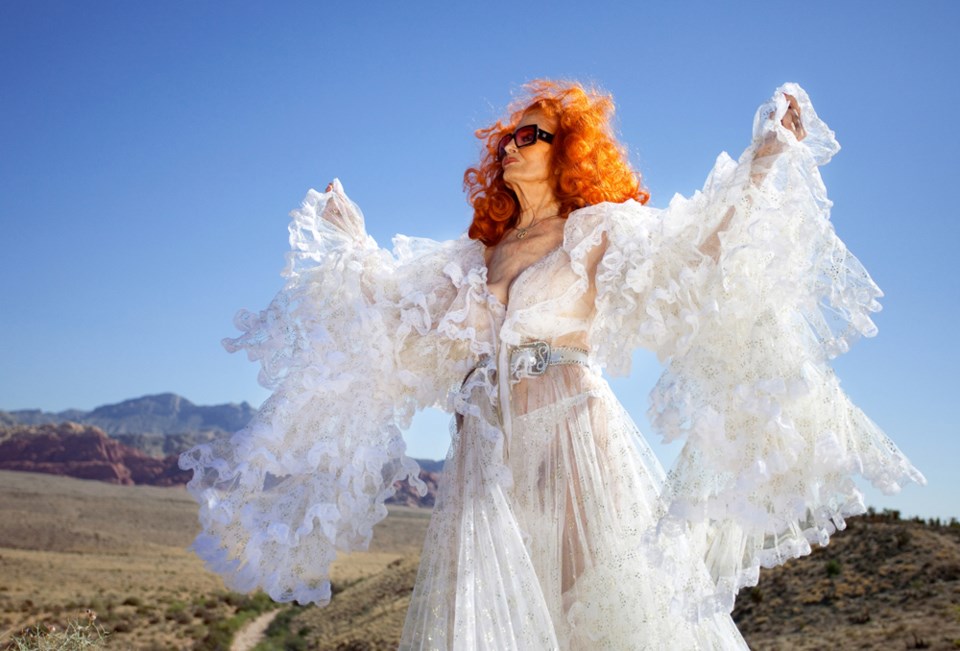Tempest Storm isn’t just a burlesque performer; she’s the living embodiment of burlesque itself.
The redheaded burlesque legend dated Elvis Presley and JFK, co-starred in a film with Bettie Page, scandalized 1950s America with her interracial marriage, and, at 88-years-old, is still bumping and shimmying on the American burlesque circuit.
“Tempest didn’t just dabble in burlesque,” says Vancouver filmmaker Nimisha Mukerji, who garnered numerous awards and critical acclaim (including from Oprah Winfrey) for her 2009 documentary 65_Redroses, about the late Eva Markvoort’s courageous battle against cystic fibrosis.
“Tempest rose to the top. She’s the greatest living burlesque performer that’s still with us. She’s had the longest career. And she’s still at it today.”
Which is why Mukerji was shocked to discover – after learning about Storm from one of Markvoort’s friends, Kaitlyn Regehr, who interviewed the legendary performer as part of her doctoral research – that her story had not yet been documented for screen audiences.
“Tempest had just recorded an album with Jack White from the White Stripes, and when I saw the images from that album, and when I listened to it, I thought, ‘There’s something about her that keeps her relevant today, and she’s still capturing the attention of people today in this amazing way,’” says Mukerji. “That started the journey.”
The journey spanned a couple of years and steeped Mukerji, Regehr (who produced the project), and cinematographer Lindsay George in Storm’s past and present. The end result is the feature-length documentary Tempest Storm, which premiered earlier this year at Toronto’s venerable Hot Docs Festival.
The film weaves together photographs and videos from Storm’s past with an all-access look at her life today: working the burlesque and celebrity autograph circuits; consulting on a clothing line; maneuvering complicated personal relationships; drawing long gazes wherever she goes.
“Some people know who she is, and some people don’t, but no matter what, she always stands out,” says Mukerji.
Storm was born Annie Banks in the small Southern town of Eastman, Georgia, in 1928. As a poverty-stricken young woman in Depression-era America, her options were limited. Burlesque, Mukerji says, was a path to empowerment.
“For a lot of the women like Tempest who came out of that era, [burlesque] was a way for escaping the limitations of their lives at the time,” says Mukerji. “Even though Tempest is known for taking off her clothes, she is a private person, and what I realized was that, for her, performing is about escape, it’s about freedom, and it’s about control.”
Once Storm stepped onto the burlesque scene, she stole the show almost immediately. Celebrities (including Presley and JFK) and the press loved her – although her 1959 marriage to jazz singer Herb Jeffries (a pioneer in African American-targeted westerns) brought no small measure of scorn from a society that still considered such interracial romances unfathomable.
“I have so much respect for her for following her heart and diving into that marriage despite the cost to her professionally,” says Mukerji.
It wasn’t hard to find the material for the film. Entering Storm’s Nevada apartment is like stepping into a museum, says Mukerji. “You’re hit with the past the moment you enter,” she says, adding that Storm is “equally proud of the images that are more contemporary and recent.”
Mukerji et al. accompanied Storm to Nevada, California, Iowa, Indiana, and Storm’s hometown in Georgia. Those days in the Deep South were particularly revelatory for Mukerji, who witnessed first hand how revered Storm is in her community, as well as how taboo the subject of burlesque remains for many Americans.
This taboo was hammered home when the filmmakers were struggling to find a cotton field in which to shoot Tempest one sunny Sunday. “Some people did take issue with the fact that Tempest is a burlesque performer. Did they want her in their fields? There is a stigma attached to it, and Tempest has always had to live with that.”
Also challenging: securing funding for the film. “It’s not easy to sell a film about a complicated woman,” says Mukerji.
They relied on crowdfunding for a significant chunk of the financing, as well as on the support and good graces of female commissioning editors. “This was a film that has been supported by women financially and would not exist if there weren’t women commissioning editors,” says Mukerji. “At some point, we embraced the fact that this film is for women, that our audience is women, and we don’t feel limited by that. We feel proud to say that. I’d love it if men watch it and enjoy it, but it’s understanding that it’s a film that deals with ageism. It’s a complicated story about a woman.”
Storm saw the film for the first time when it premiered in Toronto, and told Mukerji that she “loved the film, and she’s 100 per cent behind it.” Storm will be in attendance when the film screens at the Rio Theatre June 18-21.
• Details and tickets for the Vancouver screening of Tempest Storm at RioTheatre.ca


